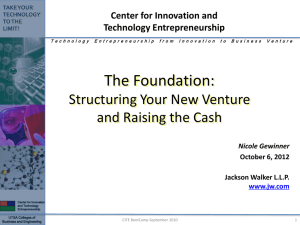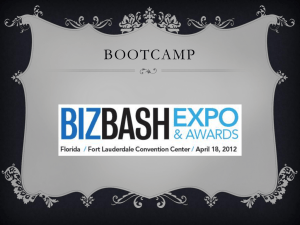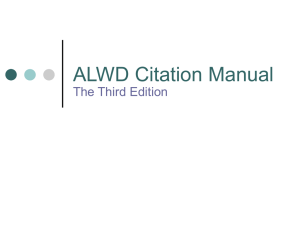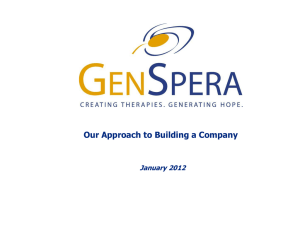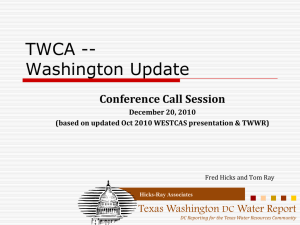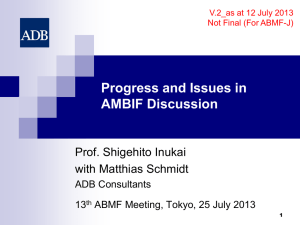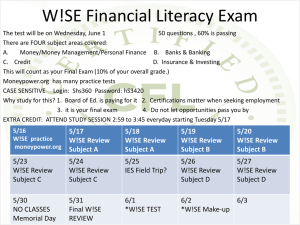Corporate Legal Structure & Operating Documents
advertisement
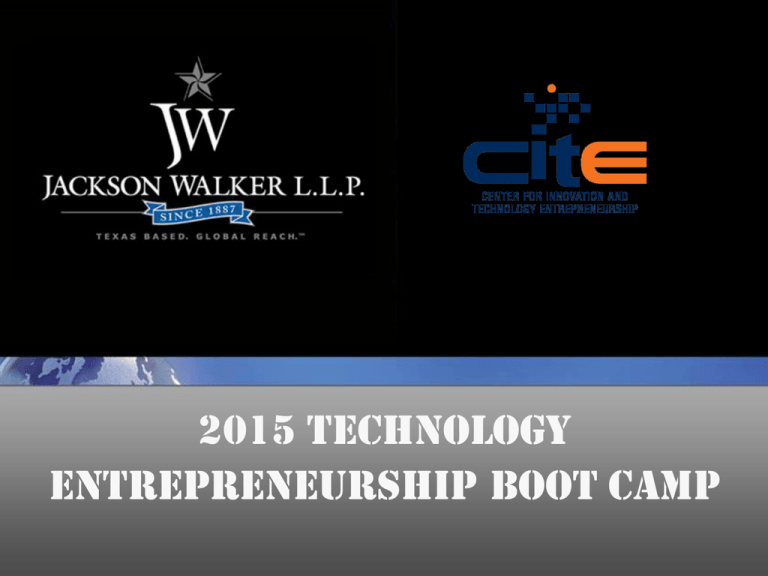
2015 Technology Entrepreneurship Boot Camp Stephanie L. Chandler • Chair – San Antonio Corporate & Securities Practice Group • Firm-wide Section Head – Technology Practice • University of Nebraska, B.S.B.A. in Finance; University of Virginia, Juris Doctorate Lauren A. Prew • Attorney: Business Transactions (Corporate/Securities/M&A) and Health Care • Texas A&M University, B.A. in English; Michigan State University, Juris Doctorate Structuring Your Entity for Success When Should You Formalize Structure? Initiation of Business Operations Asset Protection Capital Raising Succession Planning Other Factors... What structure is right for your entity? • Sole Proprietorship • General Partnership (GP) • Corporation – C-Corp – S-Corp • Limited Partnership (LP) • Limited Liability Company (LLC) Sole Proprietorship/General Partnership (GP) * Even in Texas your homestead protection may be limited depending on the specific facts so your home may still be at risk. Default Entity No liability protection, partners are jointly and severally liable for all partnership liabilities* The fallacy of a DBA filing: county DBAs and State of Texas DBAs Corporation Shareholders Board of Directors Officers: President, Vice President, CEO, CFO, Secretary, Treasurer Employees/Operations/ Contracts Ownership Strategy/Direction/ Duties to Shareholders Implementation/ Signing Authority Liabilities Jackson Walker L.L.P. Disclaimer: • • DISCLAIMER: The attached document and any additional resources provided herewith (the “Documents”) have been prepared by Jackson Walker L.L.P. (“JW”) for general informational purposes only and do not constitute advertising, solicitation or legal advice. Neither the availability, operation, transmission, receipt nor use of the Documents is intended to create or constitutes the formation of an attorney-client relationship between the user of the Documents (the “User” or “you”) and Jackson Walker or any other special relationship or privilege. The user of the Documents may not rely on the Documents for any purpose without seeking legal advice from licensed attorneys in the relevant states. The user of the Documents acknowledges that the Documents have not been drafted or tailored for the use of any individual or company based on his, her, or its particular factual situation. By accepting the Documents, you acknowledge and agree that you accept full responsibility for determining the value and use of any of the Documents. Additionally, you agree to use the Documents in compliance with all applicable laws, including the applicable securities laws, and you agree to hold JW harmless from and against any and all claims, damages, losses, obligations or liabilities arising from your failure to comply. THE DOCUMENTS ARE PROVIDED AS-IS WITH NO REPRESENTATIONS OR WARRANTIES, EITHER EXPRESS OR IMPLIED, INCLUDING, BUT NOT LIMITED TO, IMPLIED WARRANTIES OF MERCHANTABILITY, FITNESS FOR A PARTICULAR PURPOSE AND NONINFRINGEMENT. YOU ASSUME COMPLETE RESPONSIBILITY AND RISK FOR USE OF THE DOCUMENTS. Some jurisdictions do not allow the exclusion of implied warranties, so the above exclusion may not apply to you. JW expressly disclaims all liability, loss or risk incurred directly or indirectly from the use of the Documents. By using the Documents, the User waives any rights or causes of action or claims that he or she may have against JW in connection therewith. The Documents are provided only as general information and may not reflect all relevant business, legal, and tax developments and current issues, and as a result, the documents may be incomplete or incorrect. JW does not endorse and is not responsible for any third-party content that may be associated with the Documents. Even if an agent uses the Documents on your behalf (for example, an attorney, employee, or otherwise), you are still bound as a principal by all of the terms and conditions herein. Any communication received from JW, its agents, employees or other associated entities does not constitute legal advice and will not be recognized as such, unless JW has been formally engaged via a fully executed engagement letter with JW to provide legal services and then solely with respect to the client designated by such engagement letter. IRS Circular 230 disclosure: To ensure compliance with requirements imposed by the IRS, we inform you that any tax advice contained in this communication, unless expressly stated otherwise, was not intended or written to be used, and cannot be used, for the purpose of (i) avoiding tax-related penalties under the Internal Revenue Code or (ii) promoting, marketing or recommending to another party any tax-related matter(s) addressed herein. CITE BootCamp February 2015 Slide 8 Examples Provided On Website • • • • • • • • Incorporation Questionnaire Certificate of Formation (For-Profit Corporation) Organizational Consent (Texas Corporation) Bylaws (Texas Corporation) Buy-Sell Considerations Matrix Stock Option Plan Independent Contractor Services Agreement Convertible Bridge Note and Term Sheet CITE BootCamp February 2015 Slide 9 Incorporation Questionnaire • Provides a framework to think through the skeleton of the entity – Primer to preparing your documents • Gathering the information necessary to form the entity and thinking through the key roles in the entity: – Officers – Directors • Shares, Debt and Taxes • Shareholder Rights and Meetings • The KEY to success is being as organized as possible from the beginning. You’ll save money, time, and energy as your entity grows. Hard work on the front end of formation pays dividends long term. CITE BootCamp February 2015 Slide 10 Certificate of Formation (Texas For-Profit Corporation) • Document filed with the Secretary of State to form an entity • Maintained on the Secretary of State’s website • Conforms to requirements of the Texas Business Organizations Code (TBOC) • These have different names in different states: – Delaware: Certificate of Incorporation – Texas: Certificate of Formation – Others: Articles of Incorporation, Corporate Charter • For Texas Secretary of State: http://www.sos.state.tx.us/corp/forms/201_boc.pdf CITE BootCamp February 2015 Slide 11 Bylaws (Texas Corporation) • Bylaws govern the entity – define purpose; determine governance; outline rights and responsibilities of directors, officers, and shareholders; meeting structure and frequency; voting rights; etc. • Think of these literally as the “laws” of the company – they govern all action that can and cannot be taken • Bylaws must be carefully thought through because they will determine your day-to-day operation and how your corporation will function in the future • Note: Bylaws may be amended and/or restated, but doing so will be costly and require consent prior to adopting any amendment or restatement. Drafting welltailored and thought-out bylaws earlier is much easier than doing so later and having to “fix” poor bylaws later. CITE BootCamp February 2015 Slide 12 Organizational Consent (Texas Corporation) • In general, written consents enable the Board of Directors to take certain actions (TBOC and/or Bylaws provide rules) • The organizational consent is the first action that the Board of Directors takes: – – – – – – – – – – Adopt the Certificate of Formation Acknowledge the appointment of each director to the Board Approve and ratify the Bylaws Elect Officers Adopt the form for the Certificate of Stock, Corporate Seal (if required) Empower officers to issue stock, open a bank account on behalf of the company Take actions necessary to protect the entity: NDA, proprietary information and inventions agreement, IP agreements/licensing Authorize the officers to take various administrative actions Approve any contracts, leases or other agreements entered into by the corporation Authorize signatures on behalf of the corporation • Can also have a meeting to adopt these items… CITE BootCamp February 2015 Slide 13 Limited Liability Company Shareholders Members Ownership Board of Directors Managers Strategy/ Direction Officers: Officers: President, Vice President, CEO, CFO, Secretary, Treasurer President, Vice President, CEO, CFO, Secretary, Treasurer Employees/Operations/ Contracts Employees/Operations/ Contracts Implementation/ Signing Authority Liabilities Other Steps • Get the company a “social security number” – Employer Identification Number (EIN) - http://www.irs.gov/Businesses/Small-Businesses-&-SelfEmployed/Apply-for-an-Employer-Identification-Number-(EIN)-Online • • • • • Sales Tax Numbers Make any tax elections you need (i.e. S-election) Confirm Founder Vesting/83(b) Elections Employees = Texas Workforce Commission Foreign qualification if acting in other states/formed a Delaware entity, etc. CITE BootCamp February 2015 Slide 15 Issues with Joint Ownership Not only your partner, but … Buy-Sell/Shareholders Agreements/Company Agreements What if I don’t want to keep doing this? What if my partner dies? Gets divorced? Files for bankruptcy? What if we don’t agree? Issues are always easier to resolve before money is a factor Other Startup Tasks Equity Plan for Employees/Consultants Advisory Board Work for Hire Agreement for Anyone that Touches the Product NDAs (Pro-Disclosing/ Pro-Receiving) Convertible Bridge Note (Initial Capital In) Trademarks/Patents/etc. (discussed later) Stock Equity Plan • Options/Restricted Stock for employees, directors, consultants, etc. • In theory, this incentivizes employees to grow the company by providing them with a “stake” in the company • Can lower the costs of compensation • Need to consider: – – – – Exercise Price Vesting Accelerated Vesting Triggers Transfer Restrictions CITE BootCamp February 2015 Slide 18 Stock Equity Plan • Knowledge is half the battle – Phantom Gains/setting the value of the option can be difficult and expensive • The IRS and 409(A) – It is still a security – compliance with Rule 701 (The “Google” Problem) – Separate Grant Agreement needs to be approved – Approval requirements: shareholders must consent for tax preferred grants CITE BootCamp February 2015 Slide 19 Establishing an Advisory Board • Permits the Board of Directors to consult experts who will often provide strategic advice to the Board • The Advisory Board member cannot vote and does not maintain a fiduciary relationship with the corporation • The agreement outlines the Advisory Board member’s role, compensation, term, etc. • Similar to an employment agreement but for the purpose of advising the board • Very common for small, emerging companies to consult with advisory board members CITE BootCamp February 2015 Slide 20 Who’s Helping You With the Business? • Example: Independent Contractor Agreement – Scope of services, fees, term and a variety of other clauses dependent on the nature of work – Work for hire clauses or you don’t own the product – Confidentiality and trade secrets – Non-solicitation of clients, customers, and employees – Tax treatment • Employee Documentation • Ask: is the work being performed by an employee or by an independent contractor? • NDAs – Pro-Disclosing and Pro-Receiving CITE BootCamp February 2015 Slide 21 Sources of Funding: From traditional bank loans to angel investors to venture capital funds, this is where you should be looking for money in Texas… CITE BootCamp February 2015 22 Local Case Study • First Deal was a Geekdom Bridge Note… then off the races… • Larger Bridge Note Round • Factoring/Bank Financing/Manufacturing Terms • Series A Round • and now…. CITE BootCamp February 2015 Slide 23 Always Be Preparing for the Deal • Need for the “right” package – Raising Funds – Acquisition – IPO • Create the diligence binder from the start • First Deal – Often a Bridge Note – Don’t have to price (but may have to Cap Price) – Understand: • • • • Discount Conversion (Mandatory/Optional) Cap Price Term CITE BootCamp February 2015 Slide 24 Angel Investors Friends and Family Angel Funding – wealthy private individuals, with backgrounds in business, typically smaller than VC’s ($25K - $250K). They prefer to deal directly with the entrepreneur, like local deals, often want to develop a relationship with owners. Angels are limited in the number of investments they may invest in concurrently. Typically easier to deal with than VC’s. Angels support is invaluable to start-ups. Must Still Comply with Applicable Securities Laws: • Exemption (“accredited investors”) • Notice Filings Angel Investors (continued) Advantages Provide necessary capital for start-ups, usually seek smaller deals, like early stage enterprises, higher risk threshold, less formal investment criteria, often very enthusiastic, can attract additional investors, require little control, often bring vast amount of knowledge & experience, usually look beyond monetary gain, located everywhere Disadvantages Rarely make follow-up investments, tend to be less patient than VC’s, may require some form of control (board seat), may lack industry knowledge, do not have national recognition so they may be difficult to find, they choose to be “hidden” to avoid being pestered with business plans and telephone calls Regulation D • Read the Practical Guide To Raising Capital on CITE Bootcamp Page • Rule 504 provides an exemption for the offer and sale of up to $1 million of securities in a 12-month period • Rule 505 provides an exemption for offers and sales of securities totaling up to $5 million in any 12-month period – Unlimited accredited investors; max. 35 unaccredited • Rule 506 provides another exemption for sales of securities under Section 4(2) with no dollar limit. – Unlimited number of accredited investors and: • (b): With no general solicitation max. 35 unaccredited • (c): With general solicitation (JOBS Act) ONLY accredited investors Who is an “Accredited Investor”? • • • • • • • • a bank, insurance company, registered investment company, etc. an employee benefit plan a charitable organization, corporation or partnership with assets ≥ $5 million a director, executive officer or general partner of the company selling the securities a business in which all of the equity owners are accredited investors a natural person with a net worth of at least $1 million (not including his/her house) a natural person with income exceeding $200,000 in each of the two most recent years or joint income with a spouse exceeding $300,000 a trust with assets of at least $5 million Where do I find them? Traditional and Non-Traditional Lenders Most major traditional banks do not lend to startups or do so only rarely Silicon Valley Bank, Square 1 Bank lend to entrepreneurial companies (positive c/f) Accounts Receivable, Inventory, Fixed Assets all impact funding Terms may include: company’s stock, fees, collateral, agreement to pay for A/R audits, monthly reporting, audited financial statements, compliance reporting, financial covenants plus all banking relationships – checking, credit cards, investments, etc. must be established with lender Can I advertise my deal? • JOBs Act: New Rule 506(c)—General solicitation and advertising permitted – Sales only to accredited investors – Reasonable steps must be taken to verify A/I status • 506(d): Bad Actor disqualification – Rule 506 is unavailable if a Covered Person has had a Disqualifying Event • 506(e): Reporting prior “bad actor events” Can I advertise my deal? • Once you go 506(c), you can’t turn back • Extra requirements and complications may scare off some potential investors • Securities Fraud Rules still very much apply • Lack of case history dealing with the solicitation and advertising provisions – difficult to know the limits CROWDFUNDING What’s the buzz about and should you consider “kick-starting” your fundraising in Texas? CITE BootCamp February 2015; photo: http://www.nytimes.com/2014/01/23/tec hnology/personaltech/crowdfundingtips-for-turning-inspiration-intoSlide 32 reality.html?_r=0 What do you mean by “crowdfunding”? • Non-Equity Crowdfunding – – – – – Kickstarter: https://www.kickstarter.com/ Indiegogo: https://www.indiegogo.com/ Crowdrise: https://www.crowdrise.com/ Tilt: https://www.tilt.com/ Invested.in: http://invested.in/ • Equity Crowdfunding – Accredited Investors (Angel List, etc.) – New Texas portals – must be approved by the State Securities Board CITE BootCamp February 2015 Slide 33 New portals are interesting… • As part of the JOBS Act, the SEC passed legislation permitting crowdfunding, but has delayed formal regulations for crowdfunding until sometime this year [Reg A+] • Must be conducted through a registered BD or “funding portal” • Issuers can raise up to $1,000,000 in a year • Investors can invest, in any 12-month period, across all 4(a)(6) offerings: – Greater of $2,000 or 5% of income or net worth, if both income and net worth are < $100,000 – 10% of income or net worth, if either income or net worth is ≥ $100,000, up to a max of $100,000. But are they practical… …and the Disclosure Form C, which must be filed on EDGAR and provided to the intermediary and investors, includes, among other things: • Description of business, capitalization, management and ownership • Risk factor disclosures • Detailed descriptions of any exempt offerings conducted within the last three years • A financial description including discussion of results of operations, liquidity, and capital resources • Financial statements, which need to be (taking into account the targeted amount for the offering): i. ii. iii. Certified by the PEO for issuers with $100,000 or less in 4(a)(6) offerings in the last year; Reviewed by an independent public accountant (and include the review report) for $100,000 to $500,000; and Audited by an independent public accountant (and include audit report) for over $500,000. and annual reporting requirements… and more rules in Texas… • • • • • • As of 11/17/14, Texas State Securities Board issued rules regarding the registration of portals and intrastate crowdfunding exemptions. The rules issued by Texas are still relying on Section 3(a)(11) of the Securities Act (i.e. the JOBS Act that the SEC has yet to issue formal rules for). Issuer may issue securities only to investors residing within Texas, and the Issuer must also be a resident of Texas. This exempts you from registration with the SEC. Up to $1M per 12-mo period and Non-Accredited investors may contribute up to $5,000 per offering. The offering must take place online with a registered broker dealer or a registered crowdfunding portal. Limited disclosures must still be made using Form 133.17 with the State Securities Board (no audited or reviewed financial statements required unless already available prior to the offering). CITE BootCamp February 2015 Slide 36 VENTURE CAPITAL FUNDS ($1 million - $50 million) Advantages: Excellent source of capital/funding committed to your business VC’s are often prepared to invest in continued rounds as the business grows and achieves its milestones Can bring valuable skills, contacts, experience, organization and discipline to your business VC’s have common goals with the entrepreneur – growth, profitability and increased value of the business VC’s time horizon is often 3 – 7 years before exiting Looking to have a 3 – 7 times return on their investment Exiting usually in the form of a Public Offering or Sale to a larger business after reaching certain milestones VENTURE CAPITAL FUNDS ($1 million - $50 million) Disadvantages: Raising Equity Capital – demanding, costly, time consuming. Your business suffers as you devote your time to answering questions and preparing for their investment. Due Diligence process can be brutal – background checks, justification of your business plan, legal review, patent review, financial forecasts, etc. Note: this can be a very useful process to force management to think through every issue earlier than later. This is valuable even if funding doesn’t occur. Often the entrepreneur will lose control after the 2nd round of financing. VC’s may want to bring in a marquee CEO, CFO, etc. to run the business. Management reporting to the VC is often onerous, requiring 4 to 6 board meetings per year in addition to answering questions, providing updates and monthly reporting. DEAL TERMINOLOGY • NVCA Model Legal Documents – www.nvca.org - Model Legal Docs Button • Offering Terms – – – – – Pre-Money Valuation Capitalization Anti-Dilution Protections Registration Rights Preferences GRANTS http://www.grants.gov/ SBIR (Small Business Innovation Research) 11 federal departments participate 2.5% of the total extramural research budgets agencies www.sbir.gov Advantages: Funds are non-dilutive – do not have to give up any ownership Great way to fund your initial invention Disadvantages: Takes tremendous amount of time, drawn out process: 8 to 14 months No guarantee of application approval Costs associated with a properly prepared grant application Significant reporting, follow on audits, strict rules, SBIR grant may not be perfectly aligned with your company or you may have trouble finding a grant solicitation that matches your needs OTHER FUNDING ALTERNATIVES • Private Foundations • The Robert Wood Johnson Foundation – Health Care • The Kresge Foundation - Arts and Culture, Community Development, Detroit, Education, Environment, Health, and Human Services • Otto Bremer Foundation – Community-driven Investments and the Twin Cities • The Kate B. Reynolds Charitable Trust - Improving the quality of life and the quality of health for the financially needy of North Carolina • Public Foundations • • • • American Heart Association Juvenile Diabetes Research Fund National Burn Repository of the American Burn Association American Cancer Society FEDERALLY FUNDED PROGRAMS • Federal R&D Contracts – National Institutes of Health http://oamp.od.nih.gov/contracts/contract.htm – Department of Energy http://www.energy.gov – National Science Foundation http://www.nsf.gov/funding/ – US Department of Agriculture, Cooperative State research, Education and Extension Service http://www.csrees.usda.gov/fo/funding.cfm – Centers for Disease Control and Prevention http://www.cdc.gov/funding/index.html – Department of Defense http://www.defenseinnovationmarketplace.mil/ STATE/LOCAL FUNDED PROGRAMS • Texas Emerging Technology Fund (ETF)* – Apply through T3DC (South Texas): Focuses on emerging scientific or technology fields that have a reasonable probability of enhancing this state ’s national and global economic competitiveness. • http://t3dc.org/ – Must partner with a Texas State institution – Note: This program may terminate under Gov. Abbott • http://www.kwtx.com/news/state/headlines/New-Texas-Gov-Wants-ToAbolish-Emerging-Technology-Fund-290264091.html • States and municipal governments (including San Antonio) are increasingly investing in emerging companies, but their ability to responsibly do so are often questioned: – http://www.expressnews.com/business/business_columnists/david_hendric ks/article/Should-San-Antonio-reconsider-its-startup-company-6052149.php STRATEGIC PARTNERING Strategic Private Investors/Partners – Large corporations • Potential Acquirers • Potential Customers Vendor Payment Terms READ EVERYTHING … • “Boilerplate” – these are the most important provisions, do NOT ignore them. • Don’t assume a provision cannot be altered – advocate for your company and your role in the company. • Don’t sign contracts until they are reviewed by a lawyer Using Forms… 13. Venue. This Agreement and all amendments or modifications hereof shall be governed by and interpreted in accordance with the laws of the State of Confusion governing contracts wholly executed and performed therein, and shall be binding upon and inure to the benefit of the parties, their respective heirs, executors, administrators and successors. Jurisdiction for any suit filed to enforce the provisions of this Agreement by either party shall be filed in the federal or state courts of Mostfavorable District of Confusion in Hitsville, Confusion or Miracle County, Confusion. Stephanie L. Chandler, Esq. 210.978.7704 schandler@jw.com 112 E. Pecan Street, Ste. 2400 San Antonio, Texas 78205 Lauren A. Prew, Esq. 210.978.7737 lprew@jw.com 112 E. Pecan Street, Ste. 2400 San Antonio, Texas 78205

